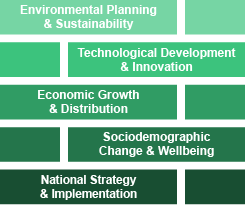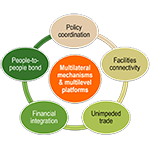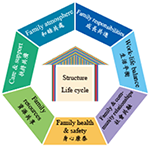
|
||||||||||||||||||||||||||||||||||||||||||||||||||||||||||||||||||||||||
| Research | ||||||||||||||||||||||||
Strategic Research Clusters
 Policy Research @ HKIAPS has identified five closely linked interdisciplinary research clusters to promote academic excellence and social contribution.
Policy Research @ HKIAPS has identified five closely linked interdisciplinary research clusters to promote academic excellence and social contribution.
In the initial phase, we are focusing on research strengths within the Chinese University and on aligning them with the government’s policy priorities and regional development strategies, particularly with the Belt and Road Initiative and the Guangdong-Hong Kong-Macao Greater Bay Area development plan. We will further identify global strategies that are relevant to Hong Kong. ■ |
||||||||||||||||||||||||
Research Projects * Policy Research @ HKIAPS member
|
||||||||||||||||||||||||
On Belt and Road Initiative and Greater Bay Area  Education as Soft Power: Hong Kong-trained Non-local University Students’ Connections and Their Career Plan in Hong Kong
Education as Soft Power: Hong Kong-trained Non-local University Students’ Connections and Their Career Plan in Hong Kong by Victor Zheng* (PI), Siu-lun Wong, Anthony Y. H. Fung*, Kevin T. W. Wong, & Hua Guo |
||||||||||||||||||||||||
 Sexual Harassment: The Challenges of Navigating Gender Norms in the Guangdong-Hong Kong-Macao Greater Bay Area
Sexual Harassment: The Challenges of Navigating Gender Norms in the Guangdong-Hong Kong-Macao Greater Bay Area by Fanny M. Cheung* (PI) & Sally K. W. Lo* |
||||||||||||||||||||||||
On Family  A Study on Family Research in Hong Kong: A Critical Review and Annotated Bibliography
A Study on Family Research in Hong Kong: A Critical Review and Annotated Bibliography by Mooly M. C. Wong (PI), Joyce L. C. Ma (PI), Po-san Wan*, Ting-kwok Iu, Lily Xia, & Rhea Rui Yuan |
||||||||||||||||||||||||
 A Study on Family Well-being in Hong Kong
A Study on Family Well-being in Hong Kong by Joyce L. C. Ma (PI), Mooly M. C. Wong, Po-san Wan*, & Lily Xia |
||||||||||||||||||||||||
On Gender  A Study on Public Attitudes towards Female Political Leadership
A Study on Public Attitudes towards Female Political Leadership by Jing Song (PI) & Sally K. W. Lo* (Co-PI) |
||||||||||||||||||||||||
 Train the Trainers: Minority Girls and Gender Justice
Train the Trainers: Minority Girls and Gender Justice by Raees B. Baig (PI), Susanne Y. P. Choi, Sally K. W. Lo*, & Janice Chan |
||||||||||||||||||||||||
On Health  An Ongoing Follow-up Study on the Participation Rate in Cervical Cancer Screening among South Asian Women
An Ongoing Follow-up Study on the Participation Rate in Cervical Cancer Screening among South Asian Women by Dorothy N. S. Chan (PI), Winnie K. W. So*, Kai-chow Choi, & Sharmila Gurung |
||||||||||||||||||||||||
 Development of a Community Health Worker-led Multimedia Intervention to Increase Cervical Cancer Screening Utilization among South Asian Women in Hong Kong
Development of a Community Health Worker-led Multimedia Intervention to Increase Cervical Cancer Screening Utilization among South Asian Women in Hong Kong by Cho-lee Wong (PI), Winnie K. W. So*, & Dorothy N. S. Chan |
||||||||||||||||||||||||
 Development of a Multimedia Health Education Programme to Promote Cervical Cancer Prevention among South Asian Women in Hong Kong
Development of a Multimedia Health Education Programme to Promote Cervical Cancer Prevention among South Asian Women in Hong Kong by Winnie K. W. So* (PI), Carmen W. H. Chan, Doris Y. P. Leung, Helen Y. L. Chan*, Sek-ying Chair, & Andrew Chan |
||||||||||||||||||||||||
 Health Behaviour in School-aged Children Study in Hong Kong: Assessing the Physical, Emotional, and Social Well-being
Health Behaviour in School-aged Children Study in Hong Kong: Assessing the Physical, Emotional, and Social Well-being by Esther S. C. Ho* (PI), Anthony Y. H. Fung*, & Annisa Lee Lai |
||||||||||||||||||||||||
On Socio-political Participation  The Advantages and Limitations of the Participation of Professionals in Public Affairs
The Advantages and Limitations of the Participation of Professionals in Public Affairs by Victor Zheng* & Po-san Wan* |
||||||||||||||||||||||||
On Youth  Young People’s Perceptions of the Future: A Comparison of Hong Kong and Beijing
Young People’s Perceptions of the Future: A Comparison of Hong Kong and Beijing by Anthony Y. H. Fung* (PI), Victor Zheng*, & Kevin T. W. Wong (Hong Kong team) |
||||||||||||||||||||||||
On Belt and Road Initiative and Greater Bay Area
Education as Soft Power: Hong Kong-trained Non-local University Students’ Connections and Their Career Plan in Hong Kong Investigators: Victor Zheng* (PI), Siu-lun Wong, Anthony Y. H. Fung*, Kevin T. W. Wong, & Hua Guo Funding source: Policy Research Funding Schemes, Policy Innovation and Co-ordination Office, HKSAR Government  Could Hong Kong increase its soft power through its generosity in welcoming non-local students? Answers to this query may have policy implications well beyond the realm of education.
Could Hong Kong increase its soft power through its generosity in welcoming non-local students? Answers to this query may have policy implications well beyond the realm of education.
Hong Kong has long had a reputation for offering high-quality higher education and, over the past several decades, has witnessed a steady influx of non-local students to its tertiary institutions. However, exactly how open and “international” this sector should be remains understudied. Many argue that priority should be given to locals over non-locals in University Grants Committee (UGC) funding, while some have criticized the authorities’ preference for mainland Chinese over other non-local students. The aim of this research is not about finding the optimal way of distributing resources between local and non-local students in Hong Kong but to empirically explore the necessity and rationale of the policy. Developed Western countries tend to welcome or even proactively recruit international students. This friendly approach is motivated by considerations beyond that of earning revenue, including a desire to restructure the population, reposition the country economically, and broaden the country’s cultural influence. Such a policy is in fact part of a strategy to project the country’s “soft power”, as Joseph Nye, who coined the term in 1990, argued. Unlike hard power, which is based primarily on military and economic might, the strength of soft power lies in unconscious ideological affinity, common values, and cultural attractions. In that sense, education may be an effective platform for nurturing such affinities. The national “Go Global” strategy, as well as the recent Belt and Road Initiative, emphasize the necessity for China to further integrate with the world. Hong Kong has historically functioned as a hub connecting China and other parts of the world via socio-economic networks. Strong soft power would allow Hong Kong to play the role more efficiently. Based on this context and from the perspective of soft power, the research team aims to examine the question of whether the educational experience of Hong Kong-trained non-local university students—regardless of their ethnic background—could in fact strengthen Hong Kong’s soft power. Qualitative and quantitative approaches would both be adopted in the investigation, which would include a questionnaire survey, in-depth interviews, and a comprehensive analysis of literature and secondary data. It is hoped that the results of the research will offer empirical support for the formulation and implementation of related policies. ■ |
||||||||||||||||||||||||
Sexual Harassment: The Challenges of Navigating Gender Norms in the Guangdong-Hong Kong-Macao Greater Bay Area
Investigators: Fanny M. Cheung* (PI) & Sally K. W. Lo* Funding source: Policy Research @ HKIAPS, CUHK  A safe and comfortable work environment is essential to recruiting and retaining talent. Talent management is part of the fundamental infrastructure that forms the backbone of the development of the Guangdong-Hong Kong-Macao Greater Bay Area.
A safe and comfortable work environment is essential to recruiting and retaining talent. Talent management is part of the fundamental infrastructure that forms the backbone of the development of the Guangdong-Hong Kong-Macao Greater Bay Area.
The #MeToo and Time’s Up movements have highlighted the perpetuation of barriers to gender equity in work and educational settings across the world. Even in developed economies, legal and administrative mechanisms to protect against sexual harassment have shown limited effectiveness, given the cultural norms arising from power differentials and sexual taboos. Differences in perceptions of gender equality and differences in hierarchical power structures due to cultural variations will directly and indirectly influence an individual’s proclivity towards and tolerance of sexually hostile behaviours. Given the increases in the number of overseas and cross-border assignments and academic exchanges, it is important to recognize cultural differences and gender norms when building knowledge about the issue of sexual harassment. With the rise of people-to-people connections in the Belt and Road Initiative, the potential risk of sexual harassment and gender discrimination in regional and international contexts should be recognized. The research team will initiate the project with a local public survey of the perceptions of Hong Kong employees and students of cultural differences in the workplace/campus when travelling within the Greater Bay Area for business and academic exchanges. In the next stage, the team will expand the study to other cities in the Greater Bay Area from a comparative perspective. The team aims to gauge the cultural awareness of people who travel among cities in the Greater Bay Area. From a policymaking and managerial standpoint, cases of sexual harassment pose a challenge to governments, academic institutions, and multinational/multi-regional companies when sending staff or students to other locations for business and exchanges. The human costs of sexual discrimination and gender-based violence affect the institutions as well as the victims. Based on these studies, the research team will provide pragmatic and evidence-based policy suggestions on how to promote gender equality and a safe workplace/campus environment, including recommendations on measures to enhance protections against sexual harassment in the Greater Bay Area. ■ |
||||||||||||||||||||||||
On Family
A Study on Family Research in Hong Kong: A Critical Review and Annotated Bibliography Investigators: Mooly M. C. Wong (PI), Joyce L. C. Ma (PI), Po-san Wan*, Ting-kwok Iu, Lily Xia, & Rhea Rui Yuan Commissioned by: Family Council, Home Affairs Bureau, & Central Policy Unit, HKSAR Government Completion date: January 2019 |
||||||||||||||||||||||||
|
||||||||||||||||||||||||
A Study on Family Well-being in Hong Kong
Investigators: Joyce L. C. Ma (PI), Mooly M. C. Wong, Po-san Wan*, & Lily Xia Commissioned by: Hong Kong Family Welfare Society |
||||||||||||||||||||||||
|
||||||||||||||||||||||||
On Gender
A Study on Public Attitudes towards Female Political Leadership Investigators: Jing Song (PI) & Sally K. W. Lo* (Co-PI) Commissioned by: Equal Opportunities Commission, Hong Kong  Female political participation is an important aspect of gender equality. However, in general, the proportion of women in positions of political leadership has always been lower than that of men. Despite the increase in female representation in the political sphere over the past few decades, women make up an average of only 23% of members of parliaments worldwide, and the growth has levelled off in recent years. In Hong Kong, women are underrepresented in political institutions, and knowledge about the public’s views on gender equality and female political leadership remains limited.
Female political participation is an important aspect of gender equality. However, in general, the proportion of women in positions of political leadership has always been lower than that of men. Despite the increase in female representation in the political sphere over the past few decades, women make up an average of only 23% of members of parliaments worldwide, and the growth has levelled off in recent years. In Hong Kong, women are underrepresented in political institutions, and knowledge about the public’s views on gender equality and female political leadership remains limited.
This study examines the Hong Kong public’s views on female political leadership and the barriers faced by women in attaining political leadership in Hong Kong. Specifically, this study aims to expand understanding of this issue in three aspects: perceptions and beliefs about gender equality in politics and female political leadership; qualities considered desirable in political leaders and differences related to gender; and structural and other barriers faced by women in attaining political leadership. Through the collection and analysis of quantitative and qualitative data, this study will generate evidence-based policy suggestions and accompanying measures for the elimination of difficulties encountered by women in leadership roles. ■ |
||||||||||||||||||||||||
Train the Trainers: Minority Girls and Gender Justice
Investigators: Raees B. Baig (PI), Susanne Y. P. Choi, Sally K. W. Lo*, & Janice Chan Funding source: Knowledge Transfer Project Fund, CUHK  Ethnic minority women in Hong Kong, mainly Muslim women, have been suffering from double marginalization and are at a greater risk of experiencing inequality than other groups because they face suppression in mainstream society as well as in their minority communities. Frontline workers find it difficult to reach out to ethnic minority women due to language and cultural barriers. The lack of interaction between minority women and local women, and the failure of minority women to integrate in local society, also means that limited progress has been made in the process of empowering women.
Ethnic minority women in Hong Kong, mainly Muslim women, have been suffering from double marginalization and are at a greater risk of experiencing inequality than other groups because they face suppression in mainstream society as well as in their minority communities. Frontline workers find it difficult to reach out to ethnic minority women due to language and cultural barriers. The lack of interaction between minority women and local women, and the failure of minority women to integrate in local society, also means that limited progress has been made in the process of empowering women.This project aims to establish connections among young minority Muslim women and local women. By strengthening their engagement with each other, the research team expects to empower both groups in the effort to advocate for the rights of women in Hong Kong. This project provides a safe platform for young ethnic minority women to discuss gender equality with people from the older generation in society, and with members of their family and their religious communities. Through training and ongoing conversations, young women will eventually build up the capacity to lead the discussion. Intergenerational gender perception is important in this context as it affects the education, employment, and lifelong development of young people. An intergenerational approach will allow us to observe acculturation and changes in the ethnic minorities of Hong Kong. The networks and mutual support groups developed from this project can serve as a focal point for the empowerment of Muslim women. The research team will also collect qualitative and quantitative data on how ethnic minorities perceive gender equality, which will shed light on issues of diversity and inclusion in our society. It is crucial for the government and service providers to possess such knowledge to be able to envisage the genuine experience of inequality encountered by ethnic minorities, and thus to provide support by devising and implementing policies and providing services. ■ |
||||||||||||||||||||||||
On Health
An Ongoing Follow-up Study on the Participation Rate in Cervical Cancer Screening among South Asian Women Investigators: Dorothy N. S. Chan (PI), Winnie K. W. So*, Kai-chow Choi, & Sharmila Gurung Funding source: Health Care and Promotion Scheme, Food and Health Bureau, HKSAR Government  Cervical cancer screening, or the Pap test, is one of the most effective ways of preventing cervical cancer via the early detection of any signs of the development of tumours. Nevertheless, despite the availability of cervical cancer screening services for the Hong Kong public and efforts on the part of the government to promote their utilization, the research team’s previous survey conducted in 2012 showed that the rate of utilization of the Pap test among South Asian women in Hong Kong was as low as 36.9%. In view of this, culturally relevant multimedia education programmes were developed to increase South Asian women’s awareness and knowledge of cervical cancer and of the measures that can be taken to prevent it. Moreover, information on how to access cervical cancer screening services and interpretation services to overcome language barriers was also given during the implementation of the programmes.
Cervical cancer screening, or the Pap test, is one of the most effective ways of preventing cervical cancer via the early detection of any signs of the development of tumours. Nevertheless, despite the availability of cervical cancer screening services for the Hong Kong public and efforts on the part of the government to promote their utilization, the research team’s previous survey conducted in 2012 showed that the rate of utilization of the Pap test among South Asian women in Hong Kong was as low as 36.9%. In view of this, culturally relevant multimedia education programmes were developed to increase South Asian women’s awareness and knowledge of cervical cancer and of the measures that can be taken to prevent it. Moreover, information on how to access cervical cancer screening services and interpretation services to overcome language barriers was also given during the implementation of the programmes.
The aim of this follow-up study was to assess whether efforts to implement health education programmes for South Asian women in Hong Kong on the topic of cervical cancer and its prevention had resulted in an increase in the utilization rate of cervical cancer screening. A follow-up survey was conducted in 2017, which revealed that 40.3% of the 776 interviewed South Asian women had previously undertaken a Pap test, suggesting a slight increase in the uptake of cervical cancer screening among local South Asian women. In this survey, the research team also found that the availability of the clinics known to the survey participants and the issue of language had a significant relationship with the barriers that South Asian women faced in utilizing cervical cancer screening services, and thus with the uptake of screening. Recently, the team conducted a second follow-up survey on this group of women, where 633 participants responded to the survey. This follow-up survey showed that an increasing number of South Asian women had attended cervical cancer screening. Overall, 53.1% of the South Asian women had previously undertaken at least a Pap test, indicating that the delivery of the education programmes had resulted in a considerable increase in cervical cancer screening uptake among the participants in the survey. These results suggest that the implementation of culturally relevant multimedia health education programmes among South Asian women in Hong Kong is an effective means of increasing their intention to undergo cancer screening, which will subsequently increase the uptake rate of cervical cancer screening among these individuals. Moreover, to overcome these barriers to the utilization of Pap tests, which were identified in the first follow-up survey, the research team proposed a currently ongoing study that involves the development of a further education programme, delivered by community health workers of South Asian origin, in an attempt to more effectively raise the intention of South Asian women within the community to undergo cervical cancer screening. ■ |
||||||||||||||||||||||||
Development of a Community Health Worker-led Multimedia Intervention to Increase Cervical Cancer Screening Utilization among South Asian Women in Hong Kong
Investigators: Cho-lee Wong (PI), Winnie K. W. So*, & Dorothy N. S. Chan Funding source: Health Care and Promotion Scheme, Food and Health Bureau, HKSAR Government  With cervical cancer being one of the most common forms of cancer among South Asian women, the dissemination of information on the benefits to these individuals of utilizing cancer screening services in preventing cervical cancer is of paramount importance. Nevertheless, South Asians may face language barriers to obtaining health-related information, which could result in their lacking awareness of the availability of cervical cancer screening services for the Hong Kong public. In light of this, it would be better if health programmes dedicated to South Asians could be delivered by community health workers (CHW), who are lay individuals within a community who are trained to deliver health-related programmes to peers in their community of the same ethnic origin. These CHWs can serve as a bridge by communicating health information between healthcare professionals and members of the community. Furthermore, these individuals would possess knowledge of the cultural practices that are detrimental to the health of their peers in the community, and would therefore provide more comprehensive and effective health education to their peers by targeting those practices. This train-the-trainer approach has previously been demonstrated to be useful in enhancing the effectiveness of health education programmes dedicated to ethnic minorities.
With cervical cancer being one of the most common forms of cancer among South Asian women, the dissemination of information on the benefits to these individuals of utilizing cancer screening services in preventing cervical cancer is of paramount importance. Nevertheless, South Asians may face language barriers to obtaining health-related information, which could result in their lacking awareness of the availability of cervical cancer screening services for the Hong Kong public. In light of this, it would be better if health programmes dedicated to South Asians could be delivered by community health workers (CHW), who are lay individuals within a community who are trained to deliver health-related programmes to peers in their community of the same ethnic origin. These CHWs can serve as a bridge by communicating health information between healthcare professionals and members of the community. Furthermore, these individuals would possess knowledge of the cultural practices that are detrimental to the health of their peers in the community, and would therefore provide more comprehensive and effective health education to their peers by targeting those practices. This train-the-trainer approach has previously been demonstrated to be useful in enhancing the effectiveness of health education programmes dedicated to ethnic minorities.
The aim of this project was to develop a CHW-led multimedia intervention for South Asian women in Hong Kong, which educates them on the risk factors for cervical cancer and on effective preventive measures, thereby enhancing their intention to undergo screening for cervical cancer. The recruited CHWs were first trained, by educating them on various aspects of cervical cancer and methods for its early detection. Through such training, these CHWs will become more competent in educating their community peers, and more effective at encouraging them to undergo cancer screening. Combining the use of a multimedia approach, which makes the programme more interesting and interactive, will be of greater benefit to the participants and lead to improved learning outcomes. In this project, the research team collected quantitative data from the programme participants, assessing their readiness to undergo cervical cancer screening, in order to evaluate whether the programme was effective at increasing their intention to undergo screening. The findings of this study will provide further evidence of the effectiveness of combining CHWs and multimedia in delivering health education programmes to increase the intention of South Asian ethnic minorities to screen for cancer, thereby making a case for such programmes to be developed to promote the health of these individuals. ■ |
||||||||||||||||||||||||
Development of a Multimedia Health Education Programme to Promote Cervical Cancer Prevention among South Asian Women in Hong Kong
Investigators: Winnie K. W. So* (PI), Carmen W. H. Chan, Doris Y. P. Leung, Helen Y. L. Chan*, Sek-ying Chair, & Andrew Chan Funding source: Knowledge Transfer Project Fund, CUHK  Cervical cancer is one of the most common forms of cancer found in South Asian women. Its prevention through early detection by screening is therefore of great importance. However, South Asians are known to face multiple barriers to the utilization of the available cervical cancer screening services in Hong Kong, including language difficulties and their lack of awareness and knowledge of effective strategies for preventing cancer. The research team’s previous survey also revealed a low rate of utilization by South Asian women in Hong Kong of those cervical cancer screening services that are available to the public. The dissemination of information on cervical cancer and the importance to these individuals of making use of cervical cancer screening services, via health education programmes, is therefore warranted. In view of this, the team proposed a study involving the development of a multimedia health education programme aimed at enhancing the knowledge of South Asian women in Hong Kong on cervical cancer, and at raising their awareness of the importance of undergoing cancer screening in preventing cervical cancer. Afterwards, the effectiveness of the programme in achieving these aims was evaluated.
Cervical cancer is one of the most common forms of cancer found in South Asian women. Its prevention through early detection by screening is therefore of great importance. However, South Asians are known to face multiple barriers to the utilization of the available cervical cancer screening services in Hong Kong, including language difficulties and their lack of awareness and knowledge of effective strategies for preventing cancer. The research team’s previous survey also revealed a low rate of utilization by South Asian women in Hong Kong of those cervical cancer screening services that are available to the public. The dissemination of information on cervical cancer and the importance to these individuals of making use of cervical cancer screening services, via health education programmes, is therefore warranted. In view of this, the team proposed a study involving the development of a multimedia health education programme aimed at enhancing the knowledge of South Asian women in Hong Kong on cervical cancer, and at raising their awareness of the importance of undergoing cancer screening in preventing cervical cancer. Afterwards, the effectiveness of the programme in achieving these aims was evaluated.
Education programmes utilizing a multimedia approach have previously been shown to enhance the effectiveness of programmes aimed at disseminating health-related knowledge to ethnic minority groups. Such approach was adopted in this study on the presentation of health information to the participants, via health talks using a variety of multimedia approaches including a PowerPoint presentation, video clip presentation, and health information booklets. During the education programme, information on cervical cancer, its risk factors and preventive measures, as well as information on the importance of screening for cervical cancer and common misconceptions on the utilization of such services, was presented. To implement the programme, the team fostered collaborations with a number of South Asian community centres and organizations so that a venue would be provided for the health talks and distribution of booklets. Overall, 51 health talks were delivered in South Asian organizations all over Hong Kong, with a total audience of 1,061 South Asian participants. A survey for evaluating the programme revealed that the majority (over 90%) of the participants agreed that the programme was effective at enhancing their knowledge of cervical cancer and increasing their intention to undergo cancer screening. This indicates that the delivery of a multimedia education programme can be useful in encouraging South Asian women to undergo screening for cervical cancer. ■ |
||||||||||||||||||||||||
Health Behaviour in School-aged Children Study in Hong Kong: Assessing the Physical, Emotional, and Social Well-being
Investigators: Esther S. C. Ho* (PI), Anthony Y. H. Fung*, & Annisa Lee Lai Funding source: Public Policy Research Funding Scheme, Policy Innovation and Co-ordination Office, HKSAR Government  The aim of the “Health Behaviour in School-aged Children” (HBSC) Study in Hong Kong is to assess the physical, emotional, and social well-being and health behaviours of school-aged children and their association with demographic factors and social and environmental contexts, and to inform policies and practices on health promotions and interventions among children. It attempts to address the policy objectives of the Commission on Children formed by the HKSAR Government in 2018. Coordinated by the World Health Organization Regional Office for Europe, the HBSC is a quadrennial study in which over 40 countries and regions are currently participating. Taking part in this cross-national study will enable reliable health-related data on children in Hong Kong to be collected and compared with comparable data from other countries. This is essential for formulating evidence-based policies, setting strategies and priorities, and developing local frameworks and indicators for monitoring the health and well-being of Hong Kong’s children, all of which are the objectives of the Commission on Children. This study will also address the increasingly prevalent mental and physical health problems of Hong Kong children, as noted in the Mental Health Review (2017), as well as the recommendation of the Review that health-related data should be collected in a timely, regular, and systematic manner. ■
The aim of the “Health Behaviour in School-aged Children” (HBSC) Study in Hong Kong is to assess the physical, emotional, and social well-being and health behaviours of school-aged children and their association with demographic factors and social and environmental contexts, and to inform policies and practices on health promotions and interventions among children. It attempts to address the policy objectives of the Commission on Children formed by the HKSAR Government in 2018. Coordinated by the World Health Organization Regional Office for Europe, the HBSC is a quadrennial study in which over 40 countries and regions are currently participating. Taking part in this cross-national study will enable reliable health-related data on children in Hong Kong to be collected and compared with comparable data from other countries. This is essential for formulating evidence-based policies, setting strategies and priorities, and developing local frameworks and indicators for monitoring the health and well-being of Hong Kong’s children, all of which are the objectives of the Commission on Children. This study will also address the increasingly prevalent mental and physical health problems of Hong Kong children, as noted in the Mental Health Review (2017), as well as the recommendation of the Review that health-related data should be collected in a timely, regular, and systematic manner. ■
|
||||||||||||||||||||||||
On Socio-political Participation
The Advantages and Limitations of the Participation of Professionals in Public Affairs Investigators: Victor Zheng* & Po-san Wan* Commissioned by: Hong Kong Professionals and Senior Executives Association |
||||||||||||||||||||||||
|
||||||||||||||||||||||||
On Youth
Young People’s Perceptions of the Future: A Comparison of Hong Kong and Beijing Investigators: Anthony Y. H. Fung* (PI), Victor Zheng*, & Kevin T. W. Wong (Hong Kong team) Collaborator: National Institute of Social Development, Chinese Academy of Social Sciences Funding source: Policy Research @ HKIAPS, CUHK  The aim of this project is to understand, investigate, and compare the perceptions of young people in Hong Kong and Beijing about their future. A city-wide survey will be conducted simultaneously in Hong Kong and Beijing in 2020, in which a common questionnaire will be used to interview young people between the ages of 15 and 34. Sub-themes of the research will include young people’s self-image, confidence in the society, subjective well-being, career planning, as well as education and job inspiration. This research will shed new light and understanding on the lives of young people and the challenges that they face living in highly globalized metropolitan cities in a borderless world with sophisticated technology. ■
The aim of this project is to understand, investigate, and compare the perceptions of young people in Hong Kong and Beijing about their future. A city-wide survey will be conducted simultaneously in Hong Kong and Beijing in 2020, in which a common questionnaire will be used to interview young people between the ages of 15 and 34. Sub-themes of the research will include young people’s self-image, confidence in the society, subjective well-being, career planning, as well as education and job inspiration. This research will shed new light and understanding on the lives of young people and the challenges that they face living in highly globalized metropolitan cities in a borderless world with sophisticated technology. ■
|
||||||||||||||||||||||||

 1. Family core beliefs;
1. Family core beliefs;

